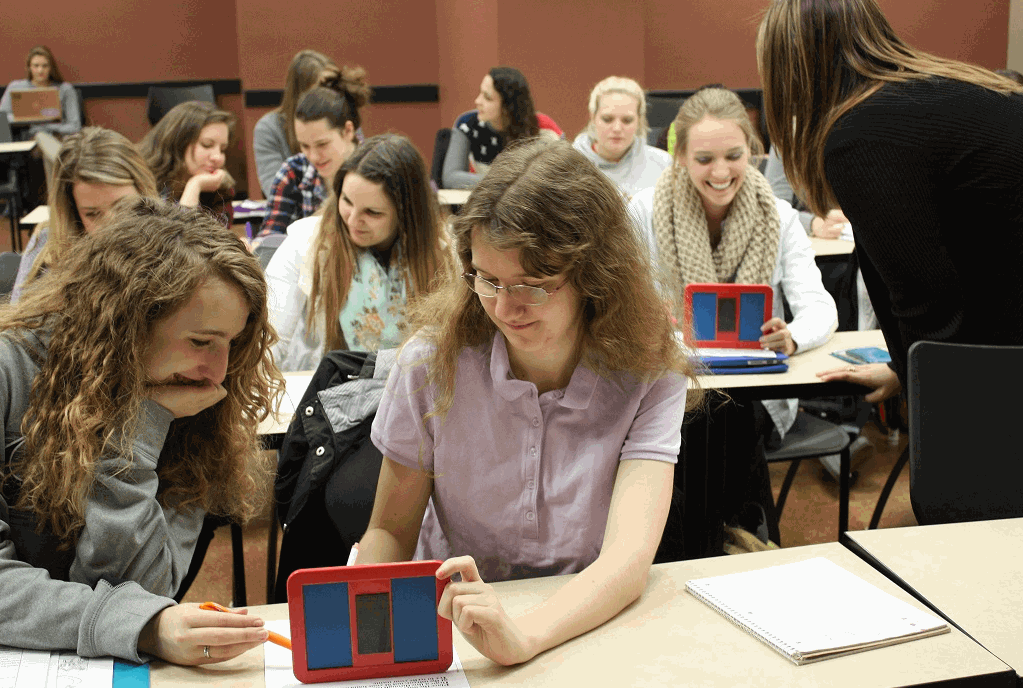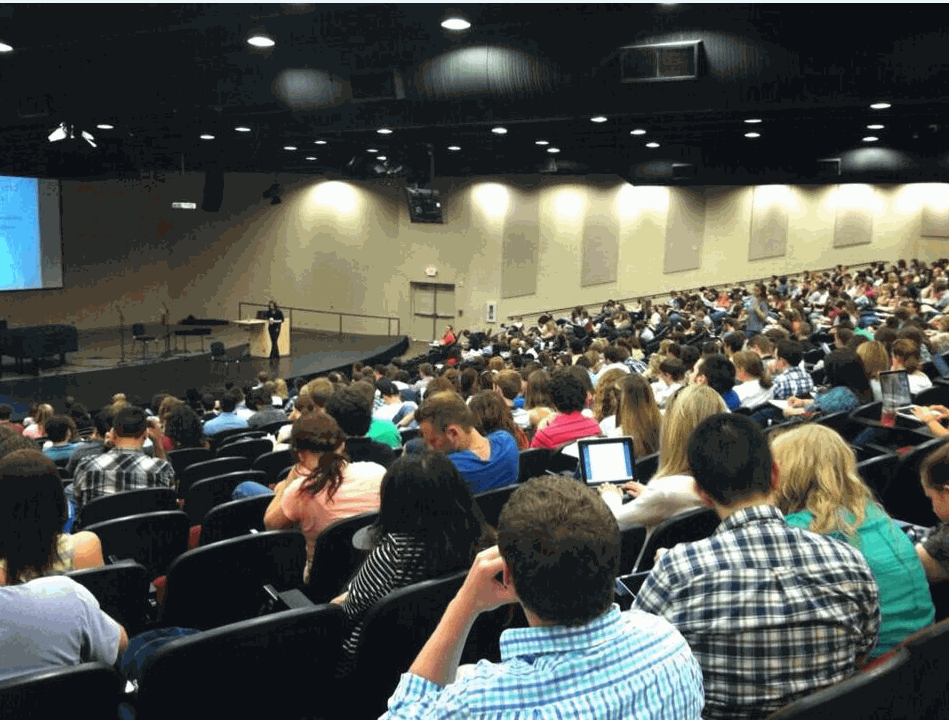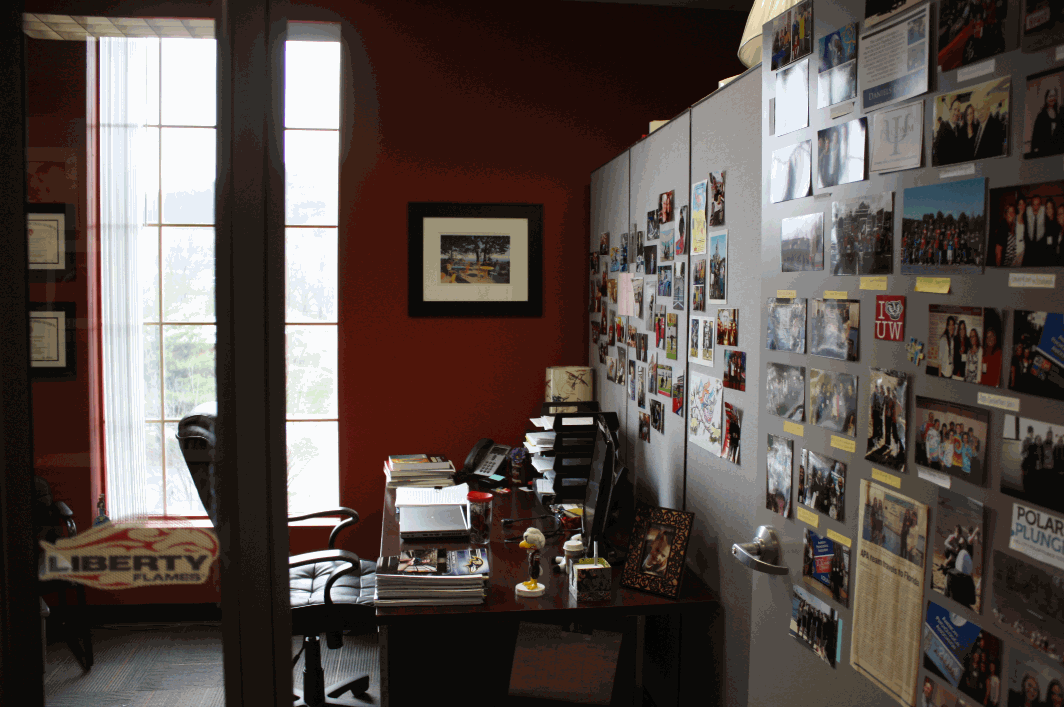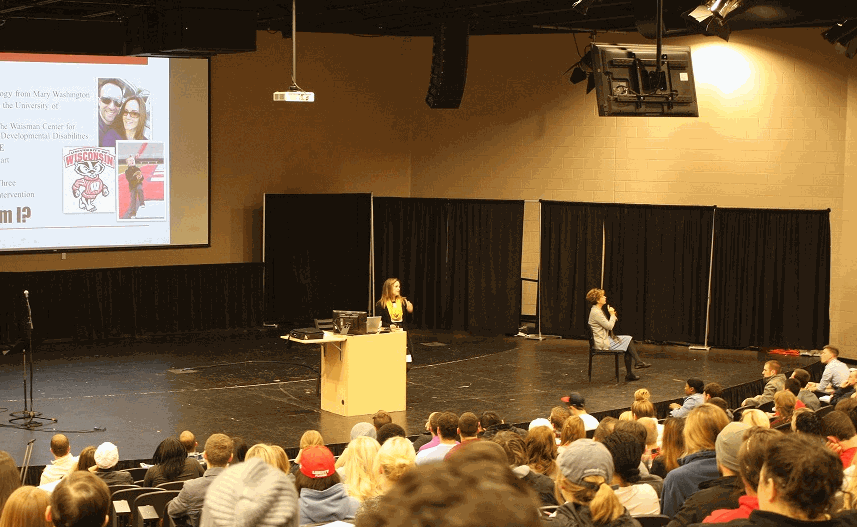 School name: Liberty University
School name: Liberty University
Type of college/university: Large private, non-profit university
School locale: foothills of the Blue Ridge Mountains (Lynchburg, VA
Classes you teach:
Introduction to Research*, Exceptional Child*, Developmental Psychology Honors, General Psychology Honors, Adolescent Development, and (coming soon) Advanced Research Methods/Statistics.
What's the best advice about teaching you've ever received?
Be yourself. My first year teaching, a colleague and I discussed various lectures that had been “homeruns” for us. We each tried to implement the approach of the other, and, needless to say, they fell flat. We still laugh about how terribly they went. It was in that moment that I realized that we each need to play to our strengths. I am able to best deliver content and co-construct knowledge with students when I am excited about both the material and my approach to that day’s class. I want all activities and methods of delivery to enhance learning, not detract from it.
What book or article has shaped your work as a psychology teacher?
I can’t think of any one book (maybe Whistling Vivaldi?), but I can think of several resources that I repeatedly use. I am constantly searching for relevant content and new strategies for enhancing student engagement and learning in the classroom (especially those that are empirically-based). As such, I follow several blogs and Twitter accounts that relate to the courses I teach. Two of my favorite blogs related to research are Jessica Hartnett’s “Not Awful and Boring Examples for Teaching Statistics and Research Methods” and Beth Morling’s “Everyday Research Methods”. These blogs offer ideas for student discussion related to recent news stories, infographics, memes, etc. From the Twitter world, I am always trying to find a way to work in a methods/statistics meme from “Research Mark Wahlberg” (@ResearchMark). These resources are appreciated by the students, who see them as relevant and up-to-date.
Tell us about your favorite lecture topic or course to teach. 
It is hard to decide which course is my favorite to teach. I love teaching Research Methods because I see the growth and transformation in students from the beginning to the end of the semester. However, I consistently leave my Exceptional Child class feeling invigorated by the day’s events. The course is a diverse group of majors (Education, Psychology, ASL, Nursing, and more), so each student brings a unique perspective to the course. Many intend on working with this population of children and families, so they are eager to learn and have a variety of questions (especially when research counters their experience or favorite Facebook posts). During this course, I work to have them apply theory to various clips from the news or popular television shows depicting various developmental disorders. I also try to show them stories that push them to see beyond their preconceived notions of what is or is not possible for individuals with disabilities. In addition, I have several activities that help them experience concepts discussed that day. Many of the papers are written reflections on current “real world” debates that encourage students to reflect on their own opinion and the peer-reviewed research on the topic (e.g., “The Mommy Wars – Does Daycare Impact Attachment” or “ADHD: To Medicate or Not?”). The course is a nice balance of content and application. Moreover, it is a field where we are constantly learning more through research. Each semester I try to incorporate new findings related to various disorders (e.g., etiology, intervention, and/or the impact on the families). I often have students email me after securing positions in the education or early intervention field letting me know how they utilized information from this course in their training or current work. It is one of the greatest parts of my job!
Describe a favorite in-class activity or assignment.
Option 1: By far, my favorite class activity is what I call “The Smartees Challenge.” When covering complex designs, I bring in bags (and bags) of Smartees. Each team is given 20 packs of Smartees. I have the teams create a 2x2 design (e.g., hair color by instruction speed) and collect data on how long it takes their “participants” to eat a pack of Smartees. For example, the “researchers” will quickly ask 5 blonds and 5 brunettes to eat a pack of Smartees. Then, they slowly ask 5 blonds and 5 brunettes to eat a pack of Smartees. The students then compute marginal means for the main effects (hair color and instruction speed) and plot the interaction. We then discuss main effects versus interactions. These are funny (and meaningless), as we might find that instruction speed only mattered for brunettes; however, the students leave with a better understanding of complex design, since they had to actually compute, plot, and interpret their data. This activity also provides an opportunity for them to discuss confounds and operational definitions. The students will comment on inconsistencies in how each group operationalized hair color (e.g., dyed versus natural) and eating time (e.g., do they count unwrapping the package?). They will frequently note possible confounding factors, such as participant gender, preference for Smartees, or consistency of the person giving the instructions. Further, since multiple teams plot their data on the board, we are able to discuss the importance of replication. For me, this lecture is a win (most semesters). In fact, when students are collecting data, my Twitter will often light up with former students commenting on how much they loved and learned from this lecture.
 Option 2: In my Exceptional Child course, when we cover the socioemotional outcomes associated with intellectual disorders, I give the students one of two 15-question quizzes. The first page has the same questions that are simple (e.g., 4+ 4 = _); however one quiz has easy questions on the subsequent pages, while the other has really hard questions. I tell them that the quiz is timed and they should put their heads down when they are done. We then grade them in class, and I have students who earned 100% raise their hands. Finally, a student reads question 8 from the easy quiz and a student reads question 8 from the difficult quiz. The activity spawns a great discussion about the role of frustration (e.g., many students with the hard quiz feeling “dumb” or giving up and guessing to finish) and perceptions of others (e.g., the students with the easy quiz often report making judgments about their classmates’ reading ability). The activity helps the students reflect on additional outcomes that might be impacted by an intellectual disability. They also problem-solve possible intervention approaches in the classroom or other settings that might minimize negative outcomes.
Option 2: In my Exceptional Child course, when we cover the socioemotional outcomes associated with intellectual disorders, I give the students one of two 15-question quizzes. The first page has the same questions that are simple (e.g., 4+ 4 = _); however one quiz has easy questions on the subsequent pages, while the other has really hard questions. I tell them that the quiz is timed and they should put their heads down when they are done. We then grade them in class, and I have students who earned 100% raise their hands. Finally, a student reads question 8 from the easy quiz and a student reads question 8 from the difficult quiz. The activity spawns a great discussion about the role of frustration (e.g., many students with the hard quiz feeling “dumb” or giving up and guessing to finish) and perceptions of others (e.g., the students with the easy quiz often report making judgments about their classmates’ reading ability). The activity helps the students reflect on additional outcomes that might be impacted by an intellectual disability. They also problem-solve possible intervention approaches in the classroom or other settings that might minimize negative outcomes.
What teaching and learning techniques work best for you?
The best techniques for me involve actively engaging students with content. I have them practice the various concepts in a variety of contexts. These activities often require reflections or questions that are counted as a quiz grade. For example, in research methods, my students are convinced that writing survey questions is “easy.” So, I have them write five survey questions about a campus issue and then collect data. They come back and compare notes with classmates and answer a set of guided questions related to the activity. The students quickly realize the strengths and limitations of their questionnaires. Often they ask leading or double-barreled questions. In addition, they realize that terms were unclear or answer choices did not cover all possible options. Then, we discuss how they might improve their surveys using concepts covered in the chapter (e.g., response sets). The students enjoy getting out of the classroom, and it helps me identify gaps in their knowledge.
 What's your workspace like?
What's your workspace like?
I often refer to my workspace as a deluxe “officle.” It is a nicely sized cubicle, and I have a huge window that overlooks campus. Most of the time it is neat and clutter free; however, I joke that the number of systematically organized piles on my desk is indicative of how busy I am at the moment. I have pictures everywhere of my family and major events. On my door I post conference, Polar Plunge, and university event pictures. Some students joke that one of their college “bucket list” items is to be in one of the pictures on my door.
Three words that best describe your teaching style.
Passionate, Interactive, Relevant
(True confession: To answer this question, I had students submit anonymous answers to this question and conducted a cursory content analysis across their responses, recent course evals, and rate my professor posts. It was fun to see their input.)
What is your teaching philosophy in 8 words or fewer? Approach each class with intentionality (and fun).
What is something your students would be surprised to learn about you? (1) I went Bungee jumping in graduate school. (2) I used to have a SWEET southern accent before moving to Wisconsin. Now, I sound like a born-and-raised Midwesterner.
What are you currently reading for pleasure? Kid President’s Guide to Being Awesome by Brad Montague and Robby Novak
What tech tool could you not live without?
The easy answer is my phone. However, on my phone, Twitter (@briannefriberg) has become one of my favorite apps. Honestly, there was a time when I resisted Twitter; however, I have found that it is a great tool for staying current on news items and issues that matter to students. I create hashtags for each of my classes (e.g., #255rocks for Introduction to Research) and encourage students to tag items that relate to course content. It is fun to see students find an example of “correlation does not imply causation” and tag the course in it. For me, Twitter has become a means for extending the classroom in a way that intersects with students’ current use of social media.
What's your hallway chatter like? What do you talk to colleagues about most (whether or not it is related to teaching/school)?
For the most part, we discuss life and funny things that happened in the classroom. Several of us are big sports fans, so we will discuss how our sports teams are doing, too. 
